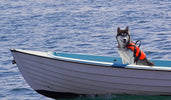
Sail Safe: Essential Tips for Ensuring Safety on the Water While Boating
, by Safe Water Team, 3 min reading time

, by Safe Water Team, 3 min reading time
There's no denying the allure of boating—the freedom of the open water, the thrill of the wind in your sails, and the serenity of nature all around you. But amidst the excitement, it's crucial to prioritize safety above all else. Whether you're an experienced sailor or a novice navigator, following these essential tips will help ensure a safe and enjoyable boating experience for you and your crew.
Before setting sail, take the time to familiarize yourself with your vessel and its equipment. Make sure you know how to operate essential systems such as the engine, navigation lights, and radio communication. Familiarize yourself with local boating regulations and weather forecasts, and always have a plan in place in case of emergencies.
Just as you wouldn't set foot on land without your shoes, you should never set sail without proper safety gear. Life jackets are a must for every member of your crew, regardless of age or swimming ability. Additionally, make sure to have essential safety equipment on board, including a first aid kit, fire extinguisher, signaling devices, and a throwable flotation device.
Boating under the influence of alcohol or drugs is not only illegal but also incredibly dangerous. Alcohol impairs judgment, coordination, and reaction time, increasing the risk of accidents on the water. To ensure a safe voyage for everyone on board, designate a sober skipper before embarking on your journey and encourage responsible drinking habits among your crew.
Weather conditions can change rapidly on the water, turning a calm day into a tempestuous ordeal in a matter of minutes. Keep a close eye on weather forecasts before and during your voyage, and be prepared to alter your plans accordingly. If thunderstorms, high winds, or rough seas are forecasted, it's best to stay ashore and wait for safer conditions.
Regular maintenance is key to keeping your vessel in safe and seaworthy condition. Inspect your boat thoroughly before each voyage, checking for signs of wear and tear, leaks, and mechanical issues. Pay special attention to critical systems such as the engine, steering, and electrical components, and address any problems promptly to prevent them from escalating into emergencies on the water.
Navigating the open water requires constant vigilance and attention to detail. Observe speed limits, maintain a safe distance from other vessels, and always yield to larger or more maneuverable boats. Keep a lookout for hazards such as rocks, shoals, and submerged objects, and use navigational aids such as charts, GPS, and radar to help you safely navigate unfamiliar waters.
Clear communication is essential for ensuring the safety of everyone on board. Establish a plan for communicating with your crew, including hand signals, verbal commands, and radio protocols. Make sure everyone knows their roles and responsibilities in case of emergencies, and practice drills regularly to ensure a swift and coordinated response when it matters most.
Boating is a rewarding and exhilarating pastime, but it's important to approach it with caution and respect for the inherent risks involved. By following these essential tips and prioritizing safety above all else, you can enjoy a lifetime of memorable adventures on the water while keeping yourself and your crew out of harm's way. So sail safe, my friends, and may fair winds and following seas always be at your back.